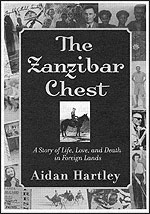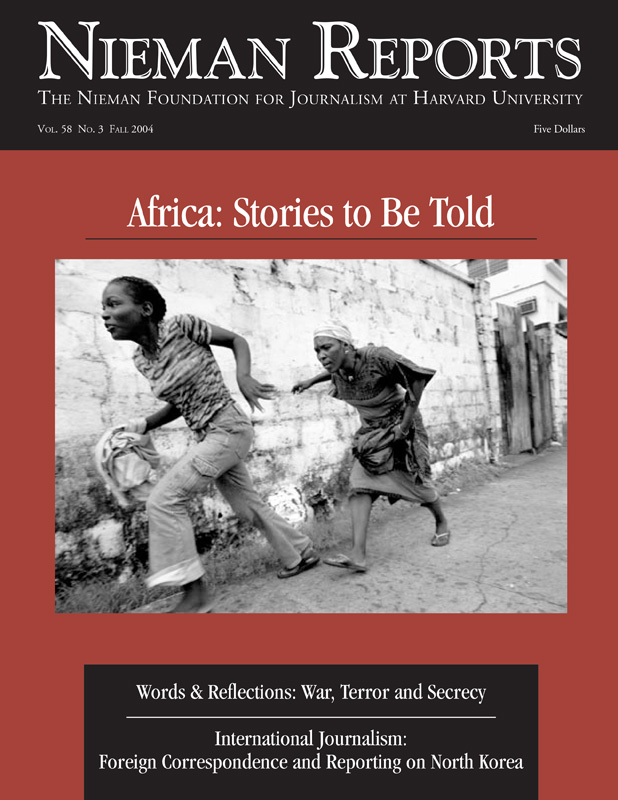 The Zanzibar Chest: A Story of Life, Love, and Death in Foreign Lands
The Zanzibar Chest: A Story of Life, Love, and Death in Foreign LandsAidan Hartley
Atlantic Monthly Press. 414 pages. $15 pb. $24 hc.Reporting on Africa for a Western audience can be strange at times. Even when diverse news organizations are forced to suddenly converge on a crisis, certain working rules easily take root back at the head office in London or New York. Amid competition from domestic events, news from other world regions and tight budgets, the reporter on the ground is supposed to know just how to pitch the story, what to include, what won’t work, and so on.
During the Ethiopian famine of 1984, for example, the massive media coverage brought disturbing pictures of starvation that shocked America and Europe into responding with aid. However, by 1992, when the Somali famine was in progress, the rules had changed. The conventional wisdom was that “donor fatigue” had afflicted the West. The foreign correspondent, to make the story compelling, had to not simply show the run of the mill starvation victim. A TV soundman, for instance, was shrewd if he managed to tape the last breaths of a dying Somali man. A British cameraman in the Sudan could demand that his guide locate a thinner group of kids after the initial one—already with bloated bellies and shrunken arms—was deemed not jolting enough for viewers.
The tension between a concern to accurately describe horror or tragedy coupled with the introspective question of whether a journalist’s work can make a difference, and the duty to simply report and move on, runs through Aidan Hartley’s “The Zanzibar Chest: A Story of Life, Love, and Death in Foreign Lands.” The book covers his reporting on Africa during the 1990’s for Reuters’ Nairobi bureau. This was a period that included the 1991 toppling of Mengistu Haile Mariam, the brutal Ethiopian strongman; the breakdown of the Somali state, the rise of warlords, civil war and famine, which resulted in Operation Restore Hope in 1992, and the deaths of 18 U.S. servicemen; and the 1994 Rwanda genocide in which about 800,000 lives were extinguished within three months.
When recalling the big tragedies and how he approached them, Hartley states, “there was no way to sell the story unless you could expose suffering on a scale rarely or never witnessed before.” At another point he writes: “Jonathan [a Reuters colleague] told me that there was only one sure way of selling a story from Africa to an editor. It was what is called in the trade ‘color’: a quirky opening vignette, a twist of pathos, the exotic or the bizarre.”
Hartley takes a reader to the center of each of the major stories and provides powerful and memorable descriptions. He’s the only European reporter with Meles Zenawi, the Ethiopian prime minister, when he’s still a rebel and marching his men at night onto the capital to seize power (“Meles now slept across from me under a thorn tree.”). He enters the Somali presidential mansion soon after Mohamed Siad Barre has been chased out of power (“At the gate, the carcass of the president’s pet lion lay in its cage.”). And he’s with Paul Kagame, Rwanda’s president, when he too is still a rebel and leading his Rwandan Patriotic Front (RPF) toward Kigali, the capital, after the genocide. At one point they are forced to stall as they consider how to tear through government troop lines (“‘Okay,’ I said, ‘we’ll walk.’ ‘You can’t possibly walk,’ said Paul Kagame, the RPF’s taciturn commander in chief.”). Africa news junkies will relish such tidbits.
But the account is also a memoir for Hartley, a Kenyan of British descent. From the aging diary notes he finds—belonging to his deceased father’s colleague, Peter Davey, who was murdered in Arabia in 1947 where he and the senior Hartley served as colonial officers—he visits Arabia and traces his family’s history there. The papers were stored by his father in a Zanzibar chest at the house the Hartleys owned on Kenya’s coast, which inspires the book’s title.
“Zanzibar Chest” is therefore a somewhat complex story in which chapters alternate between his Africa reporting and the reconstruction of a colorful family history of service to the British Crown, going back 150 years. Hartley’s father, who’s depicted as progressive and hard-working, was sent to work on water and irrigation projects in Arabia in 1938, after having served as a colonial officer in Tanganyika, presently known as Tanzania. The 16 years the elder Hartley spent in Arabia are worthy of a book in their own right and culminate in Davey’s murder by a sheikh who fell out with the British. The writing on his father, who returned to Africa and eventually settled in Kenya, is clearly a tribute to him as well as an exercise in self-discovery.
At a deeper level, what is significant about “Zanzibar Chest” is that it’s essentially a demonstration of how the personal can be put to good use in journalism. Hartley’s personal life is closely linked with East Africa. He clearly knows the area well. He scorns at mechanistic or impractical dictates from his faraway Reuters’ bosses; he mixes easily with those being covered, and he has that urge—common to the native explaining to a foreigner—to seek a nuanced explanation to a story and show there’s more to it than at first appearance.
To be sure, there’s a downside to this. Some readers may be uncomfortable with the extent to which he reveals himself. Being in his 20’s and 30’s when he reported in Africa, the book includes kiss-and-tell passages on his sex life. They’re in an account containing harrowing tales such as those on the Rwanda genocide and Somali strife that claimed the lives of three of his Reuters’ colleagues at the hands of an irate mob.
But the book is fascinating and holds one’s attention. The memoir and journalism mix quite well. A gifted writer, Hartley feels that it is only when he casts a wide eye, to take in his family’s colonial past, does he find meaning to his experience in Africa. At book’s end he observes: “I was the son who grew up loving Africa because of his father. I loved it and wanted it to love me back. In witnessing the suffering and beauty of Africa’s story, I have finally become a tiny part of its fabric.”
Wilson Wanene is a Kenyan-born freelance journalist based in Boston.



